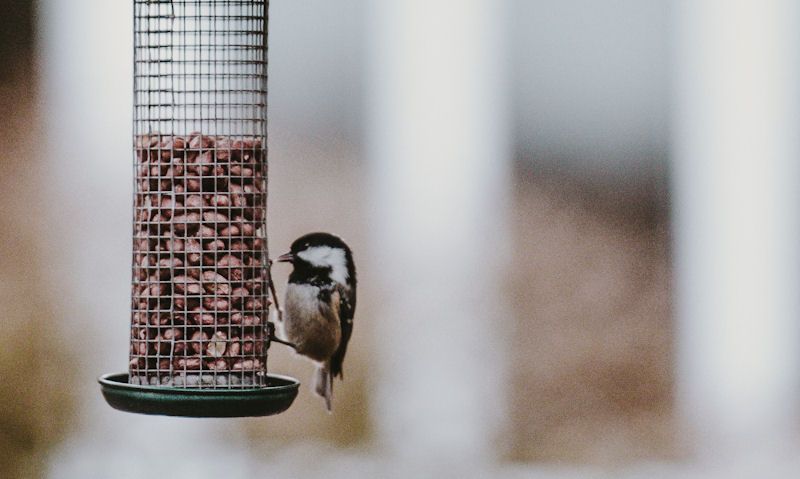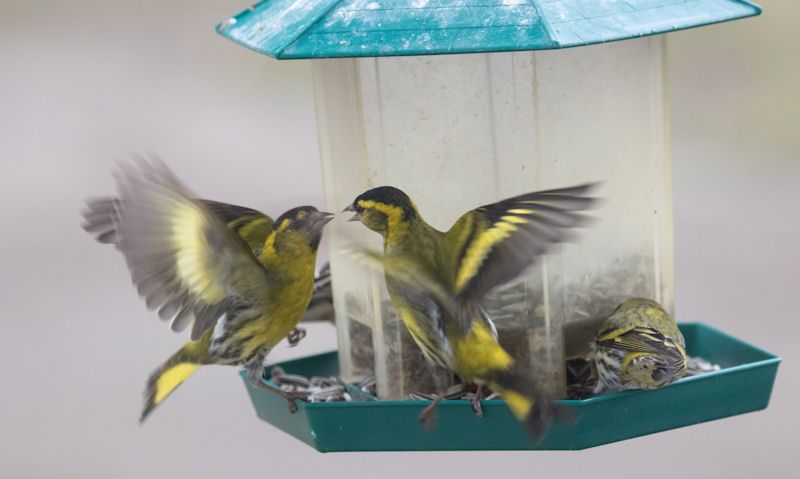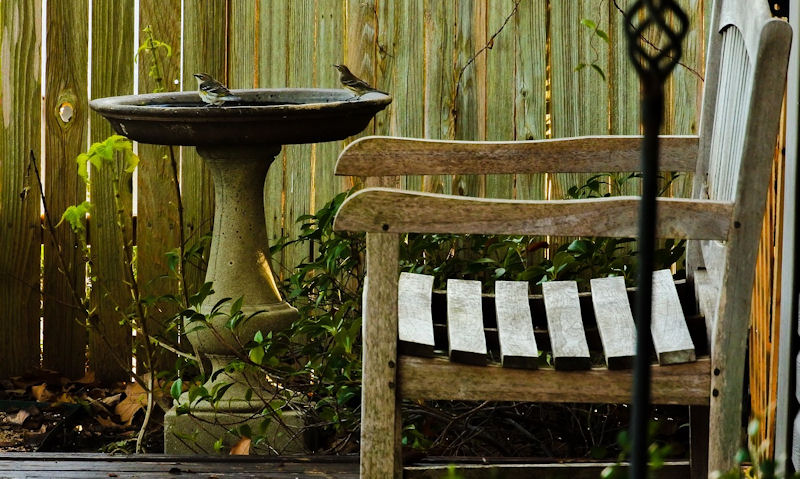When do birds eat from feeders
There's no time where wild birds in Britain stop using bird feeders, so they will need topped up all year round as birds always use them.
Wild birds use feeders in your garden all year round, there's never a time they slow down or stop, well only the weather will put a dampener on proceedings. Make sure you're using an all year bird seed mix, with fat balls and peanuts in the winter to keep up there energy.
Its never been a matter of when do birds eat from feeders, its more a case of do wild birds ever stop using feeders setup in gardens.
Answer to that is no, wild birds will never stop using feeders well continuing to feed from the peanut, seed or fat ball feeders all year round.
With the exception of a small number of birds that do use feeders, but disappear or only appear in the winter or summer months when they migrate.
All Tits, Sparrows and Robins will be seen eating from your feeder all year round, and so will the more nuisance, larger garden birds; including Pigeons, Crows and Blackbirds.
And well all feeds can be used all year, take your cue from the experts well only feeding certain foods they need for surviving in the hot Summer or chilly Winter months.
If we start in Spring, this is the nesting/breeding season so wild birds will use up a lot of energy well sourcing a nesting site and building it up over the coming days.
So high in energy peanut, seeds mixes and fat balls should be left out at all times.
Then comes the summer as the young start hacking, and as peanuts and fat balls will contain hard pieces, it risks the hackling's choking, so avoid it at all times.
Come the Autumn/Winter you'd need to focus more on high in fat food as to maintain there fat content over the cold Winter months where feeding becomes more difficult.
When in doubt, make use of wild bird feed that is promoted as all year, you can't go wrong as its specially formulated for all species.
Species using feeders all year
Common British garden wild birds will take to eating from bird feeders all year long, so its vital to have the big three feeds to sustain there healthy diet.
When we say they use feeders all year round, that will only apply to birds that regularly visit your garden.
We're not talking about wild birds that have never stopped by your garden, or are not present in your county or region as they're never likely to visit areas they don't frequent.
You can always rely on part - not all of them mind you - of the Tit family; with the Blue, Coal and Great Tit all likely to continue to feed 12 months of the year.
That also goes for the always seen House Sparrows who will be seen mostly feeding from the fat balls or suet, including the seed mixes.
Once in while you'll have a Robin stop by which will take to eating from the fat balls mostly, followed by suet, peanuts or seed.
Well Robins are ground feeding birds, you can guarantee they will take to eating dried mealworms if you have any available.
If you see a bird feeding well upside down and you're near woodlands, this is likely to be the Great Spotted Woodpecker, eating away on the fat balls or peanuts.
Last but not least, the larger garden birds are bound to drop by to feed including the Nuthatch or Jackdaw; with the nuisance Woodpigeon, Blackbirds to Crows visiting.
Birds stop using feeder
Its very rare to see birds stop using bird feeders anytime during the year, and if they do happen to disappear, something is definitely wrong.
And that doesn't go for wild birds that migrate in the Winter or Summer time.
Take the Siskin, a rare bird for most of us and well they will take to eating nuts or fat balls from the feeders, that will only be possible in the winter months.
Obvious reasons birds stop eating during various time of the year could be that they've found new, luscious feeding grounds.
It may also be possible a neighbour has setup a better bird feeding station than you, well close by a few gardens down.
Bird's won't eat rotten food so are likely to stop eating from feeders if they sense that.
However, in the Winter time when food freezes over, they may wait until the frost has passed before coming back again.
Its also possible a blanket of snow will stop them feeding at all if its covered over your feeders; so for that reason make sure you shake access snow off feeders.
Use all year round feed
When setting up bird feeders hanging off the station pole or bracket as the most useful option, do so only for seeds, peanuts or fat balls.
Bird seeds cater for many seed eating birds, and well they will take to eating from the clear plastic tubes, they would also eat seeds that fall to the ground.
Peanuts mean protein so therefore its a nutrient that's required all year round, more so during the summer but its high in fat which they need in the winter.
Fat balls are going to be the most eating food on the feeder, so keep them topped up as most bird feeder eating birds will consume them.
If the bird food mixes are available in the shops all year, then they've probably done there due diligence to make sure its suitable for all year round.
Another food to leave out that will be welcomed during the hot Summer or cold Winter months is suet in all its form; pellets, blocks or bars - all are which are healthy.
To be sure what to feed wild birds in your garden all year round, let's prioritise by season to make sure the best nutritional food is provided.
Spring
During the Spring wild birds will begin building there nest ready for the breeding season ahead, thus keeping them busy well making there nests in the wild or in bird boxes.
Therefore they will use up a lot of energy so you'd need to subsidise there diet with high energy food; this will then carry on through the Summer time.
And as wild birds tend to need softer, easy to digest foods as to prevent there chicks choking in Summer, as the chicks are not born yet, we can use peanuts and fat balls.
Peanuts are high in protein, so therefore are high in energy bird feed. Likewise, so is the ingredients commonly bonded up in fat balls.
That makes both peanuts and fat balls the most common bird food, so then will be your priority during the Spring time.
All birds will drop by and feed during this time, and will do more as they store up energy.
It won't feel like you'd be able to keep up with them at time, so make sure you have a good supply of feed available to top up them feeders.
In the Summer time
Your task at this time of the year is to feed your wild birds foods with high protein, but the usual peanuts and fat balls will have to be put away as recommended by the RSPB.
What will happen is wild birds will consume both peanuts and fat balls for themselves well at the bird feeders, but before they leave they will collect them in there mouths.
That's when the adult birds will fly back to there nest to feed the young; of which peanuts and ingredients contained with fat balls could result in the chicks choking.
Focus more on high energy food with protein that has a smooth texture, such as varieties of fresh fruits or smooth, soft suet pellets - not the block kind with hard bits.
You can also take to feeding wild birds mild Cheddar cheese - always grated - or dried or live mealworms.
Always feed birds high quality seed mixes, focusing more on black sunflower seeds.
Autumn
Feeding wild birds in your garden during the Autumn is similar to what you'd feed them in the winter.
You don't have to be concerned about there young now as this time of year the breeding season has long gone, so no need to make adjustments.
What you will need to provide wild birds in the autumn from feeders is the usual peanuts, fat balls and seeds, most of which must be high in fat.
Wild birds will naturally take to eating the fat balls most as survival instincts kick in, so its imperative they are always filled up.
Well peanuts offer energy with a high fat content, you're likely to see the peanuts used less as long as fat balls are left out near by.
With that in mind, only fill up the peanuts, including the seed feeders - a little way up, as to prevent wastage as they are unlikely to be used very often.
Chilly Winter
Difficult as it is to source food during the Winter months, its more so when the coming days or months are blanketed with frost or snow.
Making sure your bird feeders are accessible during this time would require you shaking off snow, well there's not much you can do when its frozen.
Pouring hot water over the feed will do it; though its likely to turn to ice very quickly, making it even more difficult to eat from.
What feed you provide wild birds in winter should all be high in fat, that's the healthy kind as to help wild birds build up fat to survive through the winter.
So make sure those fat ball feeders are always topped up.
Scraps can be fed to wild birds at this time which are high in fat; including cheese, pastry or biscuits - though you can't use scraps in feeders.
Summarise
Its not when do birds eat from feeders, but simply a case of wild birds feed from bird feeders hanging up in your garden... all year round.
That also goes for the bird table or the bird tray or dish hanging off the wall bracket.
All common wild birds that take to eating regularly off your feeders or bird table are likely to be seen 365 days of the year.
No much can go wrong feeding wild birds all year, and well the experts suggest you switch feeds to accommodate Spring/Summer, Autumn/Winter...
Its not massively important but do try to prioritise the nesting season in Summer.
This will help protect the young from the 'unknown to the parents' feeding there young crushed peanuts or hard bits found in fat ball mixes, all of which could choke the young.
Not at all possible birds will stop using feeders, but when they do that's attributed to the cold, freezing weather with snow blanketing the feeders.


